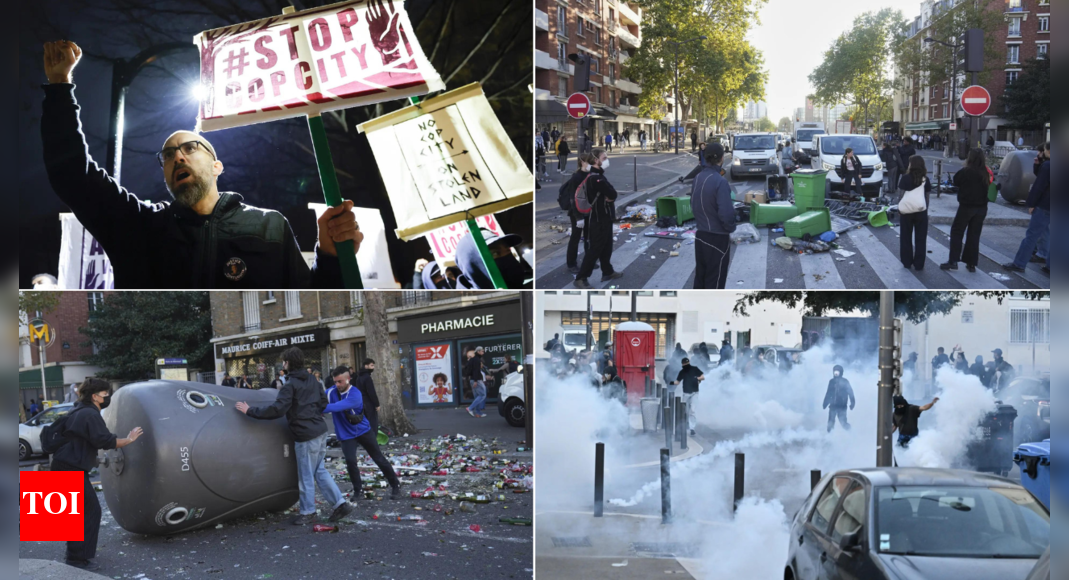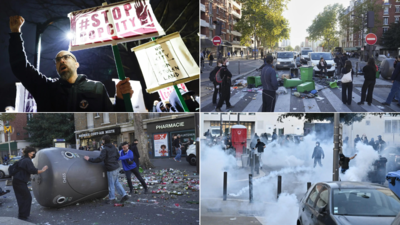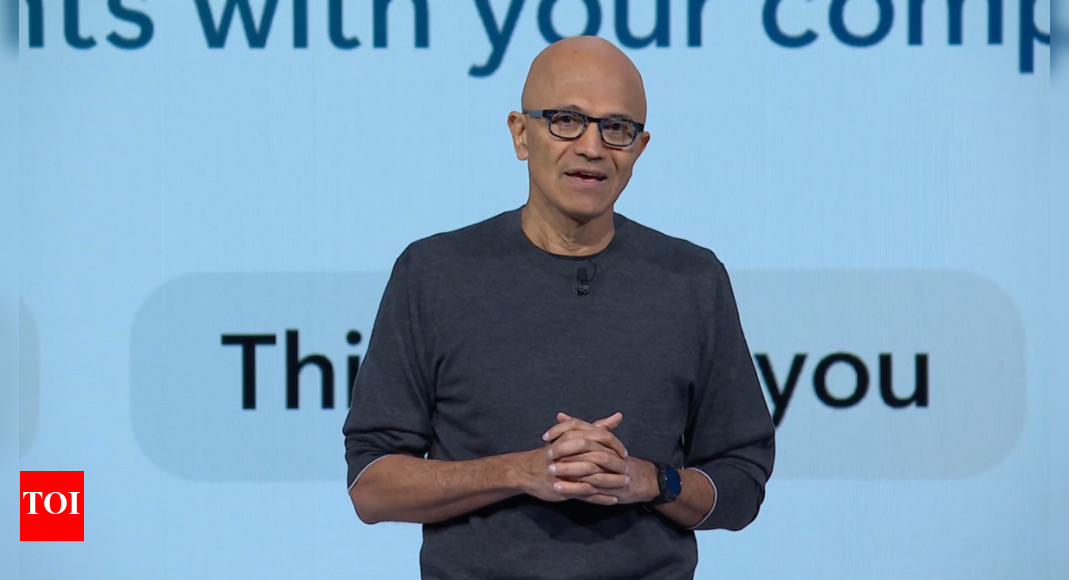[ad_1]
France was gripped by nationwide protests on Wednesday as demonstrators clashed with police, blocked roads and set fires in Paris and other cities, intensifying public anger against President Emmanuel Macron and his government. Authorities confirmed that around 300 people were arrested during the first hours of unrest, as thousands poured onto the streets under the banner of the “Block Everything” movement.In the capital, protesters set barricades alight and were dispersed with rounds of police tear gas.Interior minister Bruno Retailleau said that a bus was set ablaze in Rennes and that train services in the southwest were halted after damage to a power line. He accused protesters of trying to create “a climate of insurrection.”
Poll
Do you support the ‘Block Everything’ movement’s protests against the French government?
Nationwide disruption despite heavy police deployment
The Macron government had deployed an exceptional 80,000 police officers across the country in an attempt to prevent large-scale disorder. Despite this, protesters erected barricades, lit fires and staged demonstrations across multiple regions. Garbage bins were set alight in Paris, while commuters reported blockages on key thoroughfares.Authorities said that 75 people had been detained in the capital by 9 am local time, but the arrests rose steadily throughout the day as unrest spread. By afternoon, police confirmed nearly 200 detentions nationwide. Although the “Block Everything” movement did not fully achieve its declared aim of paralyzing the country, it created major flashpoints that disrupted transport, work commutes and daily life.
What sparked the protests?
The protests erupted after a week of political turmoil in France. On Monday, Prime Minister François Bayrou lost a parliamentary confidence vote following his announcement of sweeping austerity measures, which included cutting public holidays and freezing pensions. Bayrou resigned shortly after the defeat.President Emmanuel Macron moved quickly, appointing Defence Minister Sébastien Lecornu as the new prime minister on Tuesday — the fourth person to hold the post in just 12 months. The rapid turnover at the top highlighted France’s political instability and fuelled public frustration, with critics accusing Macron of ignoring widespread discontent.Unions and protest leaders said Bayrou’s resignation did little to ease their concerns. “The fall of the government is good, but it’s insufficient,” rail union Sud-Rail posted on X.
France’s finances are in deep trouble:
France’s political crisis is unfolding against a backdrop of worsening public finances. Macron has now appointed his fourth prime minister in a year, while the country grapples with a ballooning deficit, rising borrowing costs, and a parliament incapable of agreeing on spending reforms.First the pandemic, then the energy crisis: France has not balanced its budget since 1973, sustaining an expansive welfare state through steady growth and cheap borrowing. Macron, first as economy minister and later as president, pushed reforms such as tax cuts, spending adjustments, and raising the retirement age from 62 to 64.But debt had already been high — over 90% of GDP since 2008. The pandemic and Russia’s 2022 invasion of Ukraine made things worse. France spent heavily on subsidies to protect households and businesses, while interest rates rose sharply worldwide. Debt surged from 98% of GDP in 2019 to 114% in 2020, where it remains. The deficit reached 5.8% last year, far above the EU’s 3% threshold.Political missteps worsened the crisis: Macron’s decision to call new elections after his party’s poor showing in the European parliament vote further destabilised the government. The new National Assembly has been fractured between a leftist bloc, Marine Le Pen’s nationalist party, and centrists — united mainly in their rejection of austerity.This gridlock toppled three prime ministers in quick succession — Gabriel Attal, Michel Barnier, and most recently François Bayrou — after attempts to rein in spending.France has one of the highest tax burdens in the EU at 43.8% of GDP, matched by equally high spending on pensions, civil servant wages, and defence. Rising interest rates have pushed annual interest payments on debt to €67 billion — funds no longer available for schools, healthcare, or welfare.Economists say France will need to enact tax hikes and spending cuts worth about 5% of GDP in the coming years to restore stability. That’s possible — Greece undertook even harsher measures during its debt crisis — but politically daunting.Bayrou’s failed austerity plan, which proposed cutting €44 billion and scrapping two public holidays, underscored parliament’s resistance.
The rise of “Block Everything”
The “Bloquons Tout” or “Block Everything” movement began over the summer, gaining momentum online through TikTok, X and encrypted messaging channels. Its calls for strikes, boycotts and street protests resonated with workers, students and activists who felt Macron’s policies deepened inequality.The movement has no central leadership, which analysts say makes it unpredictable but also harder to suppress. While many posts called for peaceful action, authorities fear its decentralised nature allows for flash violence, as seen in clashes with police and property damage on Wednesday.The campaign’s tactics — from blocking roads to withdrawing money from banks and boycotting corporations such as Amazon and Carrefour — are reminiscent of the 2018–2019 “Yellow Vest” protests. Those demonstrations, triggered by fuel tax hikes, quickly snowballed into a broader anti-Macron movement.
Travel and transport chaos
The protests and strikes created severe disruption for travellers across France. Rail and air traffic faced interruptions, though authorities insisted that most metro, tram and high-speed TGV services would run normally.The RER B line, linking central Paris to Charles de Gaulle Airport, was disrupted, forcing passengers to rely on shuttle buses and taxis. Sud Aérien, a union representing airline staff, maintenance workers and ground agents, urged members to strike and called for a rally at Charles de Gaulle Airport.The Civil Aviation Authority issued warnings for travellers at airports in Nice, Marseille, Bastia, Ajaccio and other cities, urging passengers to check with airlines for possible delays and cancellations.While RATP, which manages Paris’s public transit, said metro and bus services were “almost normal,” authorities admitted that blockages by demonstrators could cause unpredictable delays. Eurostar said cross-Channel services would run but advised passengers to allow extra time for connections.
Macron under mounting pressure
The timing of the protests, just a day after Lecornu’s appointment, has intensified the political challenge for Macron. Opposition parties accused the president of ignoring voter frustration by choosing another loyalist.“He is running the risk of legitimate social unrest and institutional gridlock in the country,” the Socialist Party said in a statement.Jean-Luc Mélenchon, leader of the far-left France Unbowed, dismissed Macron’s appointment of Lecornu as a provocation. “Only the departure of Macron himself can put an end to this sad comedy of contempt for Parliament, voters and political decency,” he wrote on social media.Jordan Bardella, leader of the far-right National Rally, also criticised the president. “Emmanuel Macron’s motto: you don’t change a losing team,” Bardella posted online.
Political instability at the top
Lecornu, 39, becomes Macron’s fifth prime minister in his second term and the third in little over a year. Bayrou lasted just nine months before losing the confidence vote, while his predecessor survived barely three.Macron’s choice of Lecornu was seen as a move to maintain stability and avoid a dangerous power vacuum ahead of the protests. The president’s office said Lecornu had been tasked with seeking consensus in parliament to pass the budget, a critical priority as France faces ballooning public debt.Lecornu promised to focus on “the defense of our independence and of our power, service to the French people, and political and institutional stability for the unity of the country.”But analysts warn that with parliament deeply fractured between left-wing coalitions, centrists and the far right, Lecornu may face the same fate as his predecessors.
Public frustration over austerity
At the heart of the protests is anger over proposed austerity measures designed to cut France’s 43 billion-euro ($50 billion) deficit. Bayrou’s plan to reduce public spending by eliminating holidays, freezing pensions and welfare payments, and introducing other cuts sparked outrage among workers and unions.Many argue that the measures unfairly target lower and middle-income citizens while sparing wealthy corporations. “The austerity plan punishes those already struggling while rewarding those with influence,” one union representative said during a rally.Despite Bayrou’s departure, the public believes Macron’s government will continue with the cuts. Protesters say they are determined to fight what they describe as unjust economic reforms.
International dimension
Wednesday’s unrest coincided with a strike by London’s Underground workers and a walkout by KLM staff in the Netherlands, reflecting a broader European wave of labour discontent. Rising living costs, inflation and pressure on public finances have fuelled similar demonstrations across the continent.For France, however, the protests carry added weight given the political fragility of Macron’s government and the growing sense of alienation among voters.
Echoes of past unrest
The “Block Everything” campaign’s unpredictability and breadth of support have drawn comparisons to the “Yellow Vest” uprising. Then, too, Macron faced weeks of street battles, plummeting approval ratings and international scrutiny.Like that earlier movement, “Block Everything” has united people across ideological divides — from students and trade unionists to rural workers and urban activists. While some demonstrators demand economic reforms, others want Macron to step down entirely.
What lies ahead
The protests are expected to continue for at least two days, with unions threatening further strike action later in September. The largest air traffic controllers’ union has already announced a 24-hour walkout on September 18, raising fears of another wave of travel chaos.For Macron and Lecornu, the coming weeks will be critical. Failure to calm the streets and secure parliamentary backing for the budget could deepen the crisis and weaken the presidency further.With buses burning, trains blocked and more than 300 arrests on day one alone, France faces another turbulent chapter in its long history of social unrest.(With inputs from agencies)
[ad_2]
Source link




